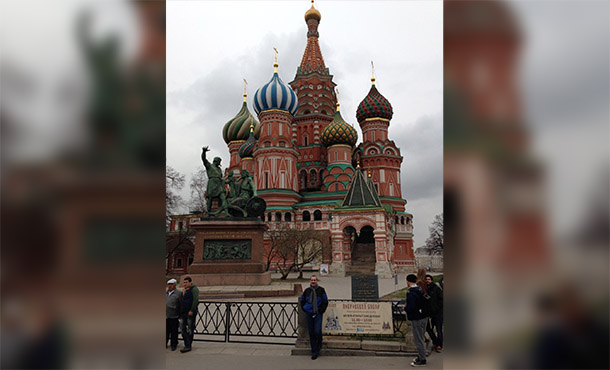Carl Stauffer has seen restorative justice practices at work in places around the world. He had the opportunity to explore a new location last month when a group invited him to Moscow, Russia.
Stauffer, a professor at Eastern Mennonite University’s Center for Justice and Peacebuilding and co-director of the Zehr Institute for Restorative Justice, had initially been scheduled to speak at a conference sponsored by the Russian Ministry of Education. When that conference was cancelled, though, a group of academics, teachers, social workers and other professionals—led by Alena Dukhanina of the Moscow State University of Psychology and Education (MSUPE) and Anton Konovalov of the Public Center for Legal and Judicial Reform and head of the Moscow Association of Mediators—asked Stauffer to still make the trip.
“They said, ‘We want to have this conversation,’ ” Stauffer says. “I welcomed that. Often at conferences, you can’t get to the real discussion because protocol gets in the way. I was looking forward to discussions with folks on the front lines of restorative justice, and that’s what happened.”

The restorative justice movement in Russia is about two decades old, he says, and much of the work currently happening is in schools. Stauffer says the primary focus is using the restorative justice circles model to address school behavior discipline issues where youth or acting out or where bullying is occurring. Students, teachers and parents participate in the process. Most of the 27 practitioners in the three-day workshop were educators, along with some who work in the criminal justice system.
“It’s a small, but active movement, and I think it’s catching on,” Stauffer says. “There are many good things they’re doing.”
The training he facilitated with the group included a look at trends in the restorative justice field, best practices and real-life case studies brought by the practitioners. He also visited a high school in which students were being trained as peer mediators and restorative justice facilitators.
Language was a challenge, he says, as only a handful of the participants spoke much English and a translator had to convey the messages back and forth, but he felt good about the overall event.
“It was very much of a seminar format where they were engaging in addressing the issues together. It felt like there was a responsive ebb and flow,” he says. “It was a lovely experience. It gave me another sense of the applicability and power of this movement to touch the far corners of the globe.”
His experience of Russia was also different than the narrative often heard in the United States, he adds. Many of the people he talked with felt positive about the direction of their country domestically, and they were very receptive and open to conversation while providing generous hospitality. The continued shift from the Soviet era to new freedoms has brought openness to new ideas and values, as well, he says, including those offered by restorative justice.
EMU has not had many recent connections with Russia, although a few professors—including restorative justice pioneer Howard Zehr, who co-directs the Zehr Institute with Stauffer—have traveled there in the past. Stauffer says there is “nothing concrete beyond this event at this point” being planned for the future there, but possibilities for partnerships exist.
“There is definitely an interest to stay in touch and get the word out,” he says. “I think there would be fascinating opportunities to explore further work in Russia.”

I’ve been to Russia and wish I could return. I’m wondering if Mr. Staffer has read “Midnight in Siberia” by David Greene. Excellent book.
I am so glad that this happened! This is amazing to see RJ practiced around the world! So glad Carl was able to experience this!